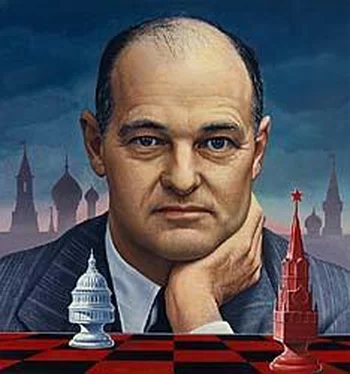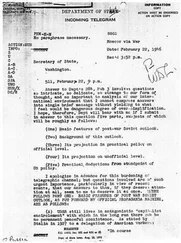It must be surmised from this that even within so highly disciplined an organization as the Communist Party there must be a growing divergence in age, outlook and interest between the great mass of Party members, only so recently recruited into the movement, and the little self-perpetuating clique of men at the top, whom most of these Party members have never met, with whom they have never conversed, and with whom they can have no political intimacy.
Who can say whether, in these circumstances, the eventual rejuvenation of the higher spheres of authority (which can only be a matter of time) can take place smoothly and peacefully, or whether rivals in the quest for higher power will not eventually reach down into these politically immature and inexperienced masses in order to find support for their respective claims? If this were ever to happen, strange consequences could flow for the Communist Party: for the membership at large has been exercised only in the practices of iron discipline and obedience and not in the arts of compromise and accommodation. And if disunity were ever to seize and paralyze the Party, the chaos and weakness of Russian society would be revealed in forms beyond description. For we have seen that Soviet power is only concealing an amorphous mass of human beings among whom no independent organizational structure is tolerated. In Russia there is not even such a thing as local government. The present generation of Russians have never known spontaneity of collective action. If, consequently, anything were ever to occur to disrupt the unity and efficacy of the Party as a political instrument, Soviet Russia might be changed overnight from one of the strongest to one of the weakest and most pitiable of national societies.
Thus the future of Soviet power may not be by any means as secure as Russian capacity for self-delusion would make it appear to the men of the Kremlin. That they can quietly and easily turn it over to others remains to be proved. Meanwhile, the hardships of their rule and the vicissitudes of international life have taken a heavy toll of the strength and hopes of the great people on whom their power rests. It is curious to note that the ideological power of Soviet authority is strongest today in areas beyond the frontiers of Russia, beyond the reach of its police power. This phenomenon brings to mind a comparison used by Thomas Mann in his great novel Buddenbrooks . Observing that human institutions often show the greatest outward brilliance at a moment when inner decay is in reality farthest advanced, he compared one of those stars whose light shines most brightly on this world when in reality it has long since ceased to exist. And who can say with assurance that the strong light still cast by the Kremlin on the dissatisfied peoples of the western world is not the powerful afterglow of a constellation which is in actuality on the wane? This cannot be proved. And it cannot be disproved. But the possibility remains (and in the opinion of this writer it is a strong one) that Soviet power, like the capitalist world of its conception, bears within it the seeds of its own decay, and that the sprouting of these seeds is well advanced.
It is clear that the United States cannot expect in the foreseeable future to enjoy political intimacy with the Soviet regime. It must continue to regard the Soviet Union as a rival, not a partner, in the political arena. It must continue to expect that Soviet policies will reflect no abstract love of peace and stability, no real faith in the possibility of a permanent happy coexistence of the Socialist and capitalist worlds, but rather a cautious, persistent pressure toward the disruption and, weakening of all rival influence and rival power.
Balanced against this are the facts that Russia, as opposed to the western world in general, is still by far the weaker party, that Soviet policy is highly flexible, and that Soviet society may well contain deficiencies which will eventually weaken its own total potential. This would of itself warrant the United States entering with reasonable confidence upon a policy of firm containment, designed to confront the Russians with unalterable counter-force at every point where they show signs of encroaching upon he interests of a peaceful and stable world.
But in actuality the possibilities for American policy are by no means limited to holding the line and hoping for the best. It is entirely possible for the United States to influence by its actions the internal developments, both within Russia and throughout the international Communist movement, by which Russian policy is largely determined. This is not only a question of the modest measure of informational activity which this government can conduct in the Soviet Union and elsewhere, although that, too, is important. It is rather a question of the degree to which the United States can create among the peoples of the world generally the impression of a country which knows what it wants, which is coping successfully with the problem of its internal life and with the responsibilities of a World Power, and which has a spiritual vitality capable of holding its own among the major ideological currents of the time. To the extent that such an impression can be created and maintained, the aims of Russian Communism must appear sterile and quixotic, the hopes and enthusiasm of Moscow’s supporters must wane, and added strain must be imposed on the Kremlin’s foreign policies. For the palsied decrepitude of the capitalist world is the keystone of Communist philosophy. Even the failure of the United States to experience the early economic depression which the ravens of the Red Square have been predicting with such complacent confidence since hostilities ceased would have deep and important repercussions throughout the Communist world.
By the same token, exhibitions of indecision, disunity and internal disintegration within this country have an exhilarating effect on the whole Communist movement. At each evidence of these tendencies, a thrill of hope and excitement goes through the Communist world; a new jauntiness can be noted in the Moscow tread; new groups of foreign supporters climb on to what they can only view as the band wagon of international politics; and Russian pressure increases all along the line in international affairs.
It would be an exaggeration to say that American behavior unassisted and alone could exercise a power of life and death over the Communist movement and bring about the early fall of Soviet power in Russia. But the United States has it in its power to increase enormously the strains under which Soviet policy must operate, to force upon the Kremlin a far greater degree of moderation and circumspection than it has had to observe in recent years, and in this way to promote tendencies which must eventually find their outlet in either the breakup or the gradual mellowing of Soviet power. For no mystical, Messianic movement — and particularly not that of the Kremlin — can face frustration indefinitely without eventually adjusting itself in one way or another to the logic of that state of affairs.
Thus the decision will really fall in large measure in this country itself. The issue of Soviet-American relations is in essence a test of the overall worth of the United States as a nation among nations. To avoid destruction the United States need only measure up to its own best traditions and prove itself worthy of preservation as a great nation.
Surely, there was never a fairer test of national quality than this. In the light of these circumstances, the thoughtful observer of Russian-American relations will find no cause for complaint in the Kremlin’s challenge to American society. He will rather experience a certain gratitude to a Providence which, by providing the American people with this implacable challenge, has made their entire security as a nation dependent on their pulling themselves together and accepting the responsibilities of moral and political leadership that history plainly intended them to bear.
Читать дальше



![Джеймс Купер - Пионеры, или У истоков Саскуиханны [The Pioneers, or The sources of the Susquehannah]](/books/395797/dzhejms-kuper-pionery-ili-u-istokov-saskuihanny-t-thumb.webp)








